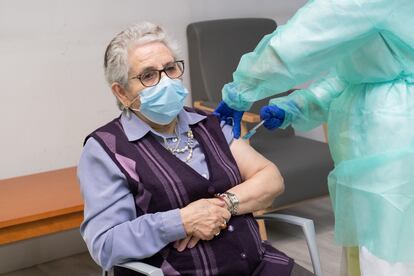Spain begins administering second dose of Covid vaccine despite delivery cuts
The reduced shipment of the Pfizer-BioNTech treatment has raised concerns about whether the government will be able to reach its goal of having 70% of the population vaccinated by summer


Spain on Sunday began administering the second dose of the Covid-19 vaccine developed by Pfizer and BioNTech to residents and staff of care homes who received the first jab on December 27, when the vaccination drive was launched. The second treatment was delivered in eight Spanish regions: the Balearic Islands, the Canary Islands, Castilla y León, Catalonia, Valencia region, Galicia, Madrid and the Basque Country.
The first shipment of the Moderna Covid-19 vaccine has also been incorporated into Spain’s vaccination campaign, which until now has made exclusive use of the Pfizer-BioNTech inoculation. On Friday, Spain received 35,700 doses of the vaccine, which requires two-doses for full immunization. Of the 1,139,400 doses delivered, Spain has administered 67.5%.
Setting time horizons, when there are variables that can’t be controlled, seems quite difficultAmós García Rojas, president of the Spanish Vaccinology Association
“The vaccination strategy is working. Spain is the ninth country in the world with respect to vaccination,” said Spanish Health Minister Salvador Illa last weekend. “Nearly 70% of the doses provided have already been administered to citizens of our country. The rate is optimum.”
According to Illa, the campaign is reaching a “stable pace” and maintained that the process will remain on track even though Pfizer has cut the next shipment of vaccines. The US pharmaceutical announced on Friday that it was temporarily reducing deliveries to all European countries due to upgrades in its production capacity, meaning Spain will only receive 56% of the doses that were scheduled to arrive this week.
Illa said the goal was to have 70% of the Spanish population immunized by summer, but experts warn this deadline may be difficult to reach if there are unforeseen setbacks such as Pfizer’s decision to reduce deliveries.
“Setting time horizons, when there are variables that can’t be controlled, seems quite difficult,” said Amós García Rojas, the president of the Spanish Vaccinology Association. The expert indicated that “organizational problems must be solved” to increase the rhythm of the vaccination drive in Spain’s regions, which are in charge not just of handling the pandemic in their territories but also the vaccination process. While some regions, like Asturias, have administered a high percentage of the delivered doses, others, like Madrid, continue to lag behind.
“In ideal conditions, with a fluid delivery of vaccines and by thoroughly evaluating the regions with a slow rate [of vaccination] to find out where the bottlenecks are, it could happen,” said García Rojas, in reference to the government’s goal to vaccinate 70% of the population. “But with the rates that some regions are going at, it is complicated.”
Spain will only receive 56% of the vaccine doses scheduled to arrive this week due to delivery cuts
Illa said that the scheduled delivery of the Pfizer-BioNTech vaccine – 370,000 doses a week – will return to normal on January 25 and that the scheduled number of vaccines will arrive by the end of the quarter. But the delivery cut has forced the Health Ministry to change its distribution criteria. Up until now, doses have been delivered equally to Spain’s 17 regions based on the distribution of the first priority group: residents and staff of care homes, other healthcare workers and people with serious disabilities. Now the government will also have to take into account how many doses regional healthcare services administered in the first week of the immunization drive to ensure they receive the second dose in time.
Three weeks have passed since the first doses were administered, meaning it is time for the second treatment. Seven days after the second jab a person is considered to be fully immunized against Covid-19 – the Pfizer-BioNTech and Moderna vaccine have found to be around 95% effective. But the vaccine could be less effective if the second dose is delivered at a later date due to supply shortages.
To prevent this from happening, the government must prioritize those who have already received the first shot. This, however, could delay the vaccination of the next priority group. “All plans fall apart,” explained Magda Campins, the head of preventive medicine at the Vall d’Hebron hospital in Barcelona. “In our hospital, the vaccination of health workers has been on hold since Thursday and the second doses are going to be prioritized. The problem is we are working from a company’s information and forecasts, but we don’t know for sure that everything is going to arrive as they say.”
English version by Melissa Kitson.
Tu suscripción se está usando en otro dispositivo
¿Quieres añadir otro usuario a tu suscripción?
Si continúas leyendo en este dispositivo, no se podrá leer en el otro.
FlechaTu suscripción se está usando en otro dispositivo y solo puedes acceder a EL PAÍS desde un dispositivo a la vez.
Si quieres compartir tu cuenta, cambia tu suscripción a la modalidad Premium, así podrás añadir otro usuario. Cada uno accederá con su propia cuenta de email, lo que os permitirá personalizar vuestra experiencia en EL PAÍS.
¿Tienes una suscripción de empresa? Accede aquí para contratar más cuentas.
En el caso de no saber quién está usando tu cuenta, te recomendamos cambiar tu contraseña aquí.
Si decides continuar compartiendo tu cuenta, este mensaje se mostrará en tu dispositivo y en el de la otra persona que está usando tu cuenta de forma indefinida, afectando a tu experiencia de lectura. Puedes consultar aquí los términos y condiciones de la suscripción digital.








































